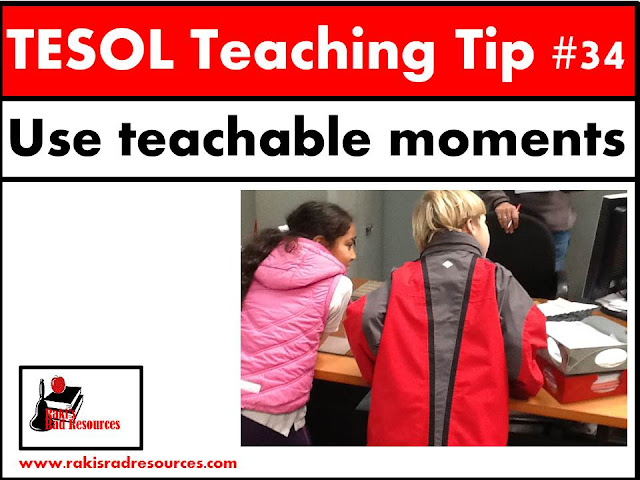My class this year consisted of 20 students, of which only 1 spoke English only in his household, and even he began his life in a bilingual environment. The other 18 spoke at least one, if not two other languages in their homes, and go to school in English, although they don’t live in an English speaking country. Due to my unique teaching position, I have had some readers ask for tips on teaching English Language Learners. Here’s this week’s Tuesday TESOL Teaching Tip:
ELL Teaching Tip #34: Use Those Teachable Moments
For all the hard work teachers put into planning our lessons, sometimes what our students remember most are those wonderful teachable moments. It’s so easy to let them slip by, especially with all the content to be covered, but our students need us to not allow that – especially our English Language Learners. I know I’ve talked before about how for English Language Learners, if they can connect the vocabulary they are learning to their own background knowledge or something that sparks their interest, they are highly more likely to remember those words.
Teachable moments are spread throughout our day – they may
 occur during a lesson, when something spawns a question or thought that hadn’t occurred to use in our planning. However more often than not, teachable moments occur outside of lesson time – in line on the way to lunch, waiting outside of the bathroom, at recess, or during morning routine. Although it seems silly to think of that time spent outside the bathroom as a “teachable moment”, if a child learns a new vocabulary word each day during that time – you’re talking about 180 possible words over the course of a year.
occur during a lesson, when something spawns a question or thought that hadn’t occurred to use in our planning. However more often than not, teachable moments occur outside of lesson time – in line on the way to lunch, waiting outside of the bathroom, at recess, or during morning routine. Although it seems silly to think of that time spent outside the bathroom as a “teachable moment”, if a child learns a new vocabulary word each day during that time – you’re talking about 180 possible words over the course of a year.Here are some tips on ways to maximize teachable moments for your students:
- Have a “question of the day” that you pose during down time or transitions (like bathroom breaks). Ask the question to ALL of your students, and you’ll find that you will learn a lot about your students, including words they don’t know, which you can hopefully fill in for them. One of my favorite questions is – “What did you eat for dinner last night?”
- Look for instances during the day that reinforce or touch on topics you’ve studied, or that you know will be of interest to your students. For example, if you are studying solids, liquids and gasses – have a “liquid hunt” at recess. Make sure that students name each liquid they find (water, soda, juice, dew, hummingbird nectar etc.)
- Let kids go off on a tangent every once in awhile. While I don’t suggest letting kids lead you off so often that you never accomplish your lesson’s objectives – there are times when students get more out of those “off on a tangent” discussions than out of an entire lesson. For example, one day during Daily Language, our sentence included the word bare. While the word was just part of a sentence that needed a capitol and a period, one of my kids kept telling me that bare should be spelled bear. This brought on a whole discussion on homophones and we ended up making a list, chart and all of different homophones – which happen to be a very hard concept for my English Language Learners.
 Do you enjoy the weekly TESOL Teaching Tips? Would you like to view an hour long presentation on this topic? I recently presented on Strategies for Teaching English Language Learners at the Everything’s Intermediate Expo. Now you can grab the presentation for just $3.95 from Teacher’s Notebook.
Do you enjoy the weekly TESOL Teaching Tips? Would you like to view an hour long presentation on this topic? I recently presented on Strategies for Teaching English Language Learners at the Everything’s Intermediate Expo. Now you can grab the presentation for just $3.95 from Teacher’s Notebook.Find more TESOL Teaching Tips here, and come back every Tuesday for a new tip!



No comments:
Post a Comment